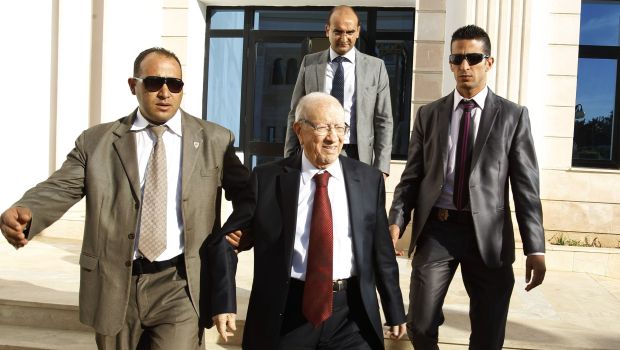
Former Tunisian prime minister Beji Caid El-Sebsi, center, leaves after a meeting as part of a dialogue between Ennahda and opposition figures in Tunis, on November 4, 2013. (Reuters/Zoubeir Souissi)
Tunis, Asharq Al-Awsat—Tunisia’s former prime minister and the leader of the Tunisian Call movement, Beji Caid El-Sebsi, warned on Sunday that the country’s forthcoming elections could be delayed due to political and economic problems.
Sebsi, speaking at a public rally in the coastal city of Sfax, said: “It is not easy to organize elections in these circumstances,” where “an atmosphere of terrorism prevails amid an appalling economic situation, and even worse social problems.”
Speaking to thousands of supporters of his movement, he added that the social and economic situation in Tunisia was getting worse, and that inner areas were continuing to be marginalized with unemployment on the increase among the youth.
However, in a reassuring message to his supporters, Sebsi said his party was prepared to fight the elections on schedule, before the end of this year, and that he was ready for the second elections to be held in the country since the revolution.
A number of political parties and unions—including the General Union of Tunisian Workers (UGTT), the largest union in the country—have expressed doubts about the possibility of holding the general election scheduled for this year on time.
Tunisia is currently governed by a cabinet of ostensibly independent technocrats, following the resignation of the coalition government led by the Islamist Ennahda Movement following mass protests in 2013, as part of an agreement struck between the government and the opposition, and brokered by trade unions and civil society groups.
Under the agreement, and as well as attempting to alleviate Tunsia’s economic problems, the current government, under Prime Minister Mehdi Jomaa, is charged with preparing new elections.
At the rally, Sebsi also responded to criticisms of his tenure as Tunisian prime minister between March and October 2011. He said: “It suffices to say that in that period, the country was organized and the way was paved for the first open and transparent elections to be held in Tunisia’s history.”
The Tunisian Call movement did not participate in the October 2011 elections, which saw Ennahda win a majority. The movement, however, become the main opposition party after the middle of June 2012 after it was formed by a combination of liberal and leftist groups, despite accusations that it had close links to figures and supporters of the old regime.
Meanwhile, three Tunisian political parties announced the formation of a new political coalition over the weekend. The coalition includes the Republican Party led by Ahmed Nejib Chebbi, the Democratic Alliance Party led by Mohamed Hamedi, and the Mouvement Echaâb led by Zouhair Maghzaoui.
The leaders of the three parties confirmed on Sunday they had reached a “consensus on the major issues, while some technical issues related to the legislative and presidential election remained unresolved.”
The three claimed that the new centrist alliance will challenge the current dominance of Tunisia’s political scene by the Tunisian Call and Ennahda movements.
Hisham Azlouk, a leading member of the Mouvement Echaâb, told Asharq Al-Awsat that negotiations between the three parties go back a few months, and that the aim of this political front is to create a coalition capable of breaking the monopoly of Tunisian Call and Ennahda, and to support the aims of the revolution.
He added that the negotiations were continuing in order to finalize common positions. Azlouk also said that the issue of the nomination of the Republican Party’s Chebbi for the presidency has not been decided, and each party had its own candidate at this current time, but that “we will agree on one candidate to represent the new coalition in order to fight the presidential elections.”
The Republican Party withdrew from the Union pour la Tunisie coalition led by Sebsi. Despite not giving reasons for the withdrawal, observers of the relationship between Sebsi and Chebbi said they expected the two to be rival candidates in the next presidential elections.
Sebsi’s announcement of his intention to run for president caught the five parties in the Union pour la Tunisie coalition by surprise, including the Republican Party, which subsequently withdrew.
